Prof. Samuel Adjei-Nsiah, Country Coordinator, N2Africa, Ghana
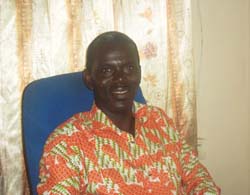 |
Prof. Samuel Adjei-Nsiah until his appointment was an Associate Professor at the College of Agriculture and Consumer Sciences, University of Ghana. Samuel is trained as an Agronomist and holds a PhD in Production Ecology and Resource Conservation from Wageningen University. He has several years of experience in integrated soil fertility management in smallholder farming systems in Ghana. Samuel has also worked on tropical legumes and in particular in nitrogen fixation in cowpea. |
His present research is in the realm of smallholder agricultural development and focuses on facilitation of multi-stakeholder collaboration for institutional innovation, food security and climate change. He has professional skills in Participatory Action Research and facilitation in multi-stakeholder processes.
Samuel is married with four children.
Contact: y_nsiah@yahoo.co.uk
Edward Baars, Business Development Officer for N2Africa
I was born on February 22, 1966 in Rotterdam to the delight of my parents and 2 year older sister although no further attempts were made for a third child. After 4 years we moved to Delfzijl, surprisingly a 4 hour drive while still located in the Netherlands. People say I kept my Rotterdam accent but managed to grasp my first foreign culture and language called Gronings. In secondary school I faced a melange of secular and religious ideologies both in teachers and fellow students. In 1985 I ended up in the Navy, again a very different culture but all in all a great experience.
I decided in 1986 to prepare for a life abroad and left for Wageningen University to study Tropical Agricultural Engineering. It was the time of paradigms around how to best go about development cooperation while analysing the many lesson learnt from the past. I started playing with the idea that through private sector involvement one could tackle the sustainability issue but had a hard time to get rapport, hence shifted to the Marketing faculty. In 1991, I successfully completed my thesis combining the Engineering and Marketing disciplines.
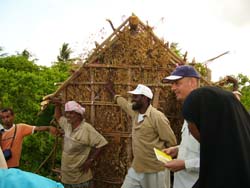 |
Photo: Edward Baars (blue cap) during field work in Jamama, Southern Somalia in 2008 for the EC funded Support to Agricultural Marketing Services and Access to Markets Project (SAMSAM) on the horticulture, sesame and bananas supply chains. The banana findings were presented at the International Conference on Banana and Plantain in Africa called, `Harnessing International Partnerships to Increase Research Impact’, or The Banana 2008 conference in Mombasa, Kenya. This also resulted in a publication titled ‘A ripe time for Somali bananas?’ (The New Agriculture Website). |
My thesis was based on a large irrigation scheme in Mendoza, Argentina and I went back several times to also visit Chile, Peru, Brazil and Uruguay. I was to work for Euroconsult in the Fayoum, Egypt while pursuing a PhD. Instead in 1993 I took the opportunity to start my own company in Kenya, growing and exporting fruits and vegetables and learnt many things they don’t (want to) teach you in school. Family considerations brought me back to Holland end 1999 where I worked for a marketing research company but was beeped up to work in Somalia from 2002-2011 having close ties with the private sector and somehow Somalia is still in my system. With IFDC thereafter I was involved in implementing a private sector led project which broadened my scope in the region to South-Sudan, Ethiopia, Uganda, Mozambique and still Kenya.
Currently I am very excited to start with N2Africa as the Senior Business Development Officer, a unique combination of research, private sector and development cooperation, all of which I have gained a rich experience with.
Edward Baars (e.baars@cgiar.org)
Peter Ebanyat, Country Coordinator for Uganda
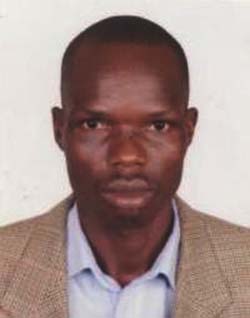 |
Peter Ebanyat holds a PhD (Agronomy/Soil fertility) from the C.T. de Wit Graduate School for Production Ecology and Resource Conservation (PE&RC), Wageningen University, The Netherlands. His area of expertise is farming systems and legume agronomy. He has worked for Makerere University since 1996 rising from Assistant Lecturer to Senior Lecturer. His research interests are in smallholder systems intensification with legumes, using action research approaches in the context integrated soil fertility management and value chains. Peter has also coordinated multi-disciplinary research projects including; Strengthening University-Farming Community Engagement, Institutionalizing Quality Assurance Mechanisms and Dissemination of Commercial Products. |
Peter has published 15 articles in peer-reviewed journals and supervising over 10 graduate students (MSc and PhD). Peter is based at Makerere University and IITA, Kampala Uganda.
Contact: peter.ebanyat@gmail.com
Endalkachew Wolde-meskel, Country Coordinator Ethiopia
Endalkachew Wolde-meskel is Country Coordinator for N2Africa Project, Ethiopia. He joined the project from Hawassa University, Hawassa, Ethiopia where he was an Associate Professor of Soil Microbiology at the School of Plant and Horticultural Sciences. He obtained his PhD from Norwegian University of Life Sciences in 2004.
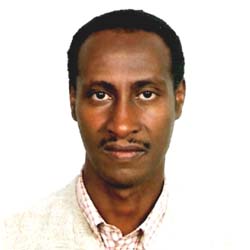 |
His main expertise is on rhizobiology and on the N2-fixing symbiosis with legumes. But also on nutrient cycling in farming systems in the tropics; on selection and identification of elite N fixing strains; on ecology of indigenous and naturalized rhizobial populations aiming on enhancing of N2 fixation in farming systems. He coordinated north-south collaborative projects on legume-rhizobium symbiosis and on investigation of cyanobacterial biofetilizer for production of horticultural crops. He has extensive experiences on exploration of biodiversity of rhizobia where he identified several novel genospecies and described new species. Endalkachew has supervised more than 46 MSc and PhD students and published in peer-review international journals. Contact: ewm_endalkachew@yahoo.com |
Joost van Heerwaarden, Coordinator Research and Data
My name is Joost van Heerwaarden and I have been freshly appointed as coordinator research and data for phase II of N2Africa. As of March 1st, I will be taking over from Linus Franke, who has accepted a faculty position at the University the Free State in south Africa.
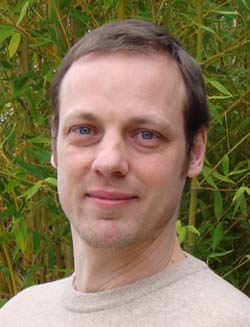 |
Originally trained as a biologist, I have a background in statistics, quantitative genetics and computer modelling, with a focus on crops and agriculture. Before my current job at the statistics department of Wageningen University I worked for two years at UC Davis in the United states, and before that was based in Mexico for eight years, working on smallholder seed systems at the Internal Maize and Wheat Improvement Center (CIMMYT) and the Mexico’s National Autonomous University (UNAM). After a number of years crunching numbers I am thrilled to join the N2Africa team, interact with many of you, and to put my expertize and skills at your service. I will be joining the planning meetings in Ethiopia, Ghana and Nigeria at the beginning of March and hope to have the opportunity to visit Tanzania and Uganda soon. I am looking forward to meeting everyone involved in the project and can’t wait to start working with all of you on this challenging endeavour. |
Kind regards,
Joost van Heerwaarden (joost.vanheerwaarden@wur.nl)
Freddy Baijukya, N2Africa Coordinator, Tanzania
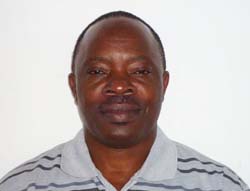 |
Frederick Baijukya is a System and Legume Agronomist - and coordinator of N2Africa in Tanzania. Prior to that, he was employed by CIAT as Legume agronomist and leader of N2Africa Phase I in Rwanda and DR Congo. Frederick has worked as Principal Research Scientist in the Department of Research and Development, Ministry of Agriculture, Food Security and Cooperatives in Tanzania. He also spent four years (2005-2009) at FAO-UN analyzing trans-boundary ecosystems and bio-security threats of agricultural activities in the Tanzania-Uganda-Rwanda-Burundi inter-phase systems. |
Frederick holds a Ph.D (Agronomy/Soil fertility) from the C.T. de Wit Graduate school for Production Ecology and Resource Conservation (PE&RC) at Wageningen University in The Netherlands. Frederick has more than 20 years of agricultural research and development focusing on smallholder farmers in rural societies of Africa. He has published over 25 papers in peer reviewed International Journals and he has supervised and co-supervised more than 28 MSc and PhD students from sub-Sahara Africa, Asia and Europe. Frederick is based at IITA East Africa Hub Centre in Dar es Salaam, Tanzania.
E-mail: f.baijukya@cgiar.org
